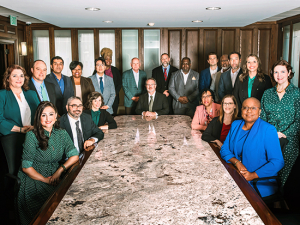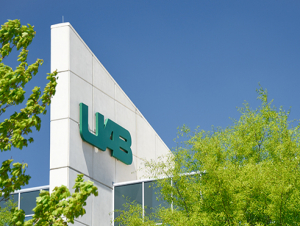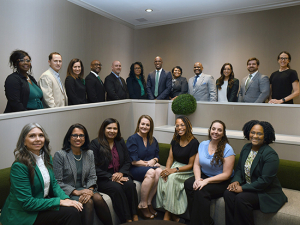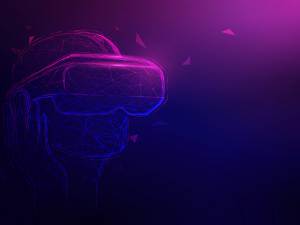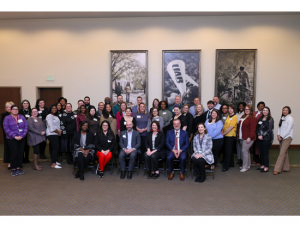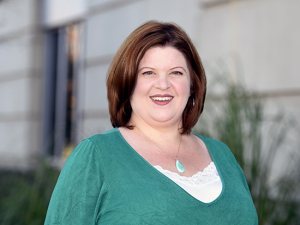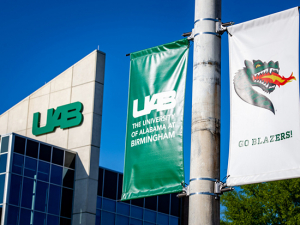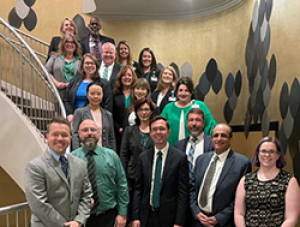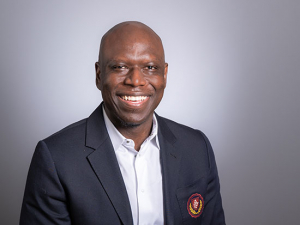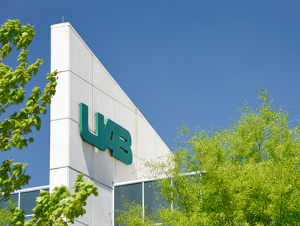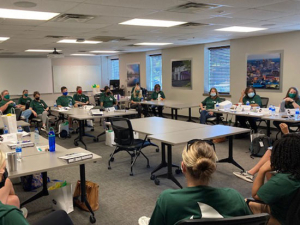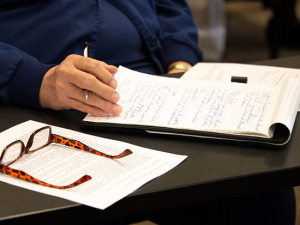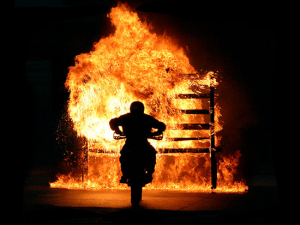In the beginning, there was Ada Long, who founded the original University Honors Program 25 years ago.
 |
| “We want to be a first choice for undergraduate education and really capitalize on all of the opportunities in undergraduate research and experiential education here at UAB and in the greater Birmingham community,” says Bradley Newcomer, director of the UAB Honors College. |
It was joined eventually by the Early Medical Professional Schools Acceptance Program (EMPSAP), Science and Technology Honors, and Experiential Learning and Global and Community Leadership Honors. Now, a new Honors College will bring a student-friendly and organizational focus to the programs.
“UAB has a strong tradition in undergraduate honors education, dating to when Ada Long created the University Honors Program,” says Bradley Newcomer, Ph.D., associate dean for Honors in the College of Arts & Sciences. “That program was a national model for undergraduate honors programs in a big university setting. Now, we have four universitywide honors programs plus the early dental, medical and optometry school programs. Overall, we have approximately 1,000 honors students in various programs on our campus, and it’s time once again for UAB to evolve its programs and give our students the tools they need in their drive to succeed.”
To that end, the University of Alabama System Board of Trustees approved the creation of the new Honors College at its Nov. 15 meeting. Newcomer is the director of the UAB Honors College, which will house all of the universitywide honors programs and the early dental, medical and optometry school programs under one umbrella.
This will enable the programs to unify their processes, structures and branding without sacrificing the core integrity of the existing programs. It will also provide a single point of entry for prospective and current students and help them identify the best set of honors opportunities to support their educational and professional goals.
“The Honors College will increase the visibility of honors education on campus and in the community,” Newcomer says. “We want to be a first choice for undergraduate education and capitalize on all of the opportunities in undergraduate research and experiential education at UAB and in the greater Birmingham community.”
Many universities have trended toward establishing honors colleges in recent years. The National Collegiate Honors Council published a monograph on the honors college phenomenon in 2008. Its research and surveys revealed four primary reasons institutions have created an honors college:
- Recruit stronger students
- Improve the overall campus academic quality (including non-honors courses)
- Improve the quality of honors education opportunities
- Raise the profile of honors within the institution
“By having the UAB Honors College, we will be able to really work and capitalize on the strengths of each of our programs, and it will help us integrate the programs better,” Newcomer says. “We’re not planning on merging programs. We cannot sacrifice the core identities of the programs. I think that would be a travesty. We just need to be smarter with how we use our resources. An honors college will enable us to do that and help us leverage new resources for our students in the future.”
Newcomer hopes to begin a strategic planning process for the Honors College in the coming months. Small changes will begin with this year’s applications for prospective students. Newcomer has other plans too, including the implementation of signature programs for the college — specifically study away programs in Chinese and Arabic — and creating opportunities with research companies at Innovation Depot and local biotechnology companies.
“But beginning a strategic planning process is critical right now,” Newcomer says. “We want to bring in community members, partners and key university stakeholders to help take honors education at UAB to the next step.”
How UAB is different
After UAB started the University Honors program 25 years ago, similar programs popped up at other competitor institutions through the years. Some were able to make it; many foundered under financial stress. “It takes a lot of resources for staffing and to give the students the type of education they need,” Newcomer says.
UAB continued to maintain its program at a very high level through the years and has celebrated its uniqueness. The University Honors Program is open to students from any major, but has a special interdisciplinary core curriculum. It’s the only honors program in the state with its own specially designed core.
The Science and Technology Honors Program started approximately seven years ago with a focus on science and engineering students. The GCL Honors began approximately five years ago when the demand for honors education continued to grow. Its focus is on social justice and entrepreneurialism and encouraging students to discover their passions about issues facing the community, state, nation and world and finding a way to be part of the solution. The Experiential Learning Scholars Program, created approximately three years ago, helps students create their own unique learning plan that coordinates and enhances their normal coursework with experiential activities or outside the classroom activities.
Each of the programs takes approximately 50 students per year; the standards to be accepted are tough and the process is highly competitive. Newcomer says that’s not the case at all institutions.
“Some schools use their honors college as a marketing and recruitment tool,” Newcomer says. “They bring in high-achieving students and give them scholarships, laptops, special housing and make them feel special. We want honors education to be about the education, not about recognition for what you did in high school. It’s a different philosophy. We want to create an enhanced educational environment that changes the lives of our students.”
UAB’s small, intimate universitywide honors programs help make that possible, Newcomer says. UAB Honors students have the opportunity to receive a lot of individual attention because each enrolling class typically is no more than 50 students.
This enables students to develop relationships with faculty members and gives them unlimited opportunities.
“There are so many opportunities for students here at UAB,” Newcomer says. “We’re big enough that we have all these research and experiential education opportunities, and we’re small enough in terms of undergraduate population that our students are not just a number. Students have the option to make those quality relationships with faculty and staff. And if students really take initiative and build those relationships, they can really carve out a fabulous, one-of-a-kind education that they can’t get anywhere else.”
Newcomer wants the education UAB Honors College students receive to put them at the forefront of finding solutions to some of our most pressing problems today — renewable energy, diseases, drug discovery and delivery systems and developing technologies — among many others.
“That’s what our institution is set up to do,” he says. “When these critical issues humanity faces are being solved, we want UAB Honors College students right there.”

